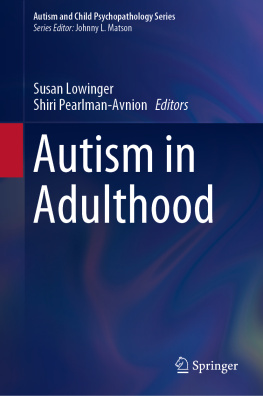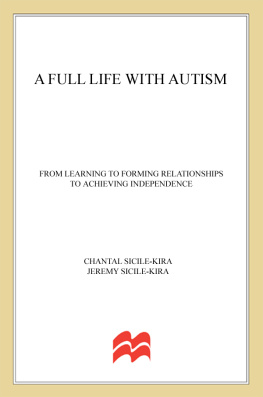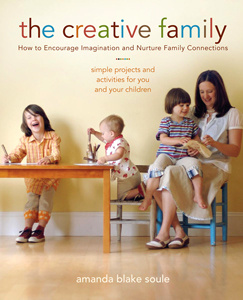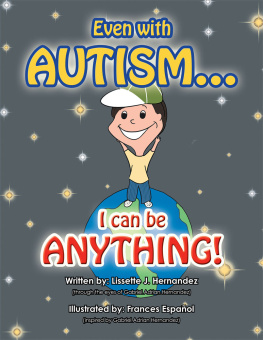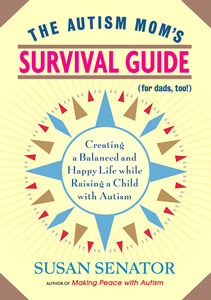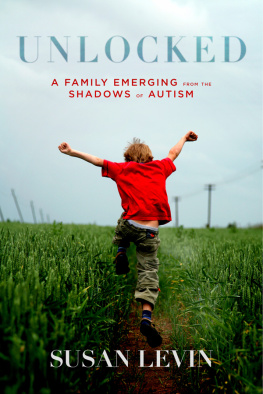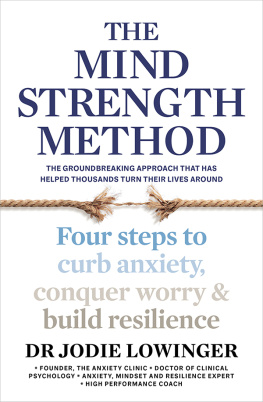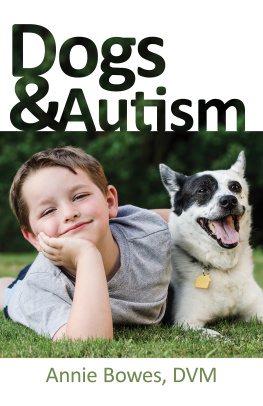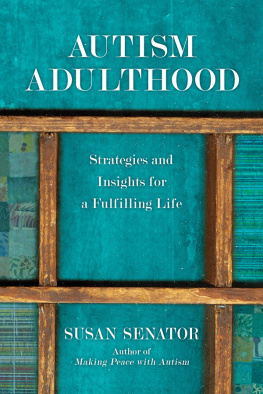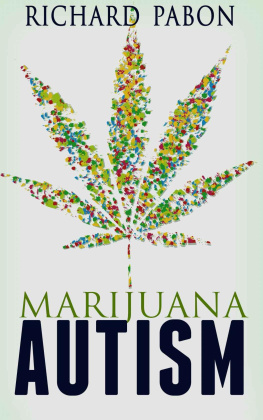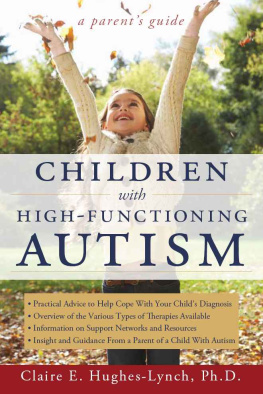Susan Lowinger - Autism in Adulthood
Here you can read online Susan Lowinger - Autism in Adulthood full text of the book (entire story) in english for free. Download pdf and epub, get meaning, cover and reviews about this ebook. year: 2019, publisher: Springer International Publishing, genre: Home and family. Description of the work, (preface) as well as reviews are available. Best literature library LitArk.com created for fans of good reading and offers a wide selection of genres:
Romance novel
Science fiction
Adventure
Detective
Science
History
Home and family
Prose
Art
Politics
Computer
Non-fiction
Religion
Business
Children
Humor
Choose a favorite category and find really read worthwhile books. Enjoy immersion in the world of imagination, feel the emotions of the characters or learn something new for yourself, make an fascinating discovery.
- Book:Autism in Adulthood
- Author:
- Publisher:Springer International Publishing
- Genre:
- Year:2019
- Rating:4 / 5
- Favourites:Add to favourites
- Your mark:
- 80
- 1
- 2
- 3
- 4
- 5
Autism in Adulthood: summary, description and annotation
We offer to read an annotation, description, summary or preface (depends on what the author of the book "Autism in Adulthood" wrote himself). If you haven't found the necessary information about the book — write in the comments, we will try to find it.
Autism in Adulthood — read online for free the complete book (whole text) full work
Below is the text of the book, divided by pages. System saving the place of the last page read, allows you to conveniently read the book "Autism in Adulthood" online for free, without having to search again every time where you left off. Put a bookmark, and you can go to the page where you finished reading at any time.
Font size:
Interval:
Bookmark:
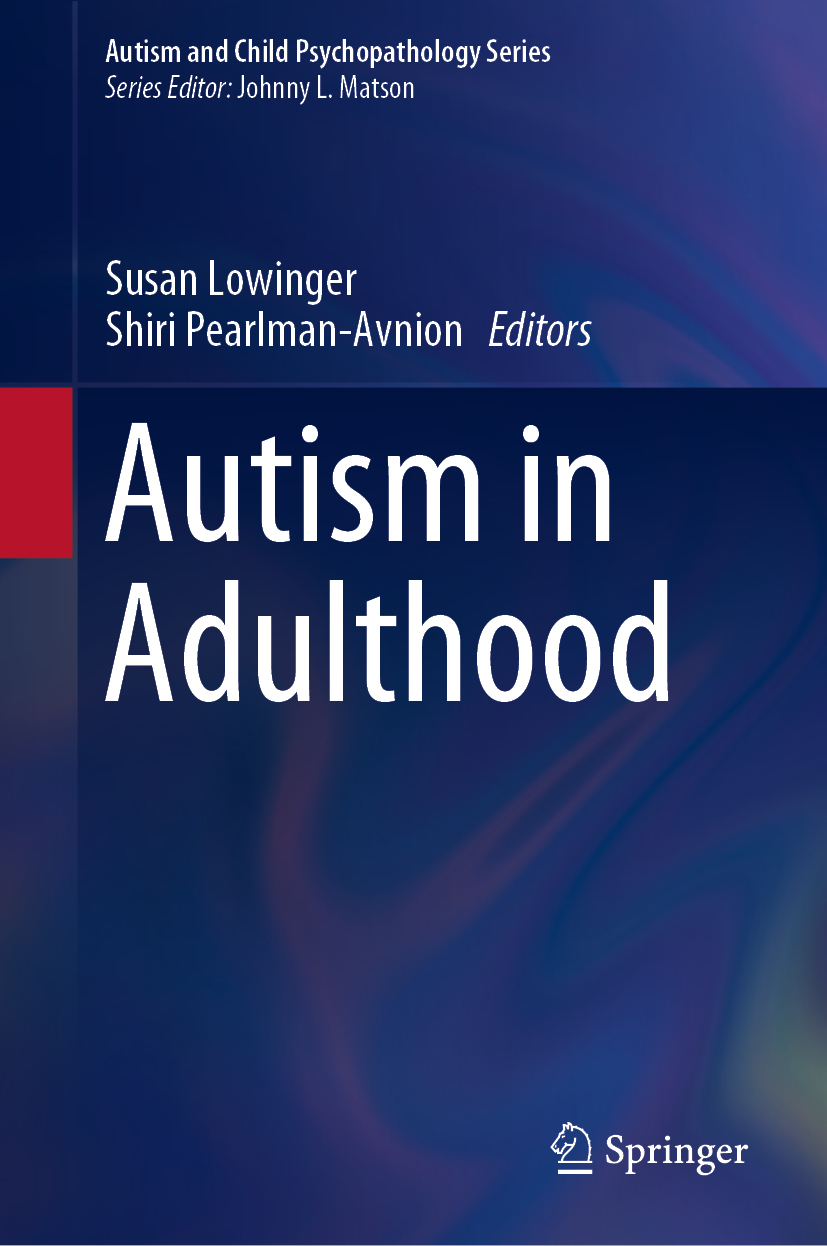
More information about this series at http://www.springer.com/series/8665

This Springer imprint is published by the registered company Springer Nature Switzerland AG
The registered company address is: Gewerbestrasse 11, 6330 Cham, Switzerland
In recent years, there has been a noticeable change in the research regarding Autism Spectrum Disorder (ASD). Previously, the majority of studies focused on infancy, childhood, or, at the latest, adolescence. Today, a growing interest in adults with ASD is evident. There are various reasons for this change. One is that the population of adults with ASD has grown, both because the children diagnosed with ASD matured, and because the rate of diagnosis among adults has increased.
Nevertheless, despite interest in the ever-growing population of adults diagnosed with ASD, a greater understanding of the most effective interventions and comprehensive research is still needed. Many adults with ASD, including those on the high-functioning end of the autism spectrum (HF-ASD), have difficulty dealing independently with challenges such as housing, employment, higher education, relationships and sexuality, and other issues and expectations related to integration into the world of adulthood.
Young adulthood is a particularly difficult developmental stage. After high school, people often lose access to many of the support services they received through the education system. Alongside this reduction in support, the social communication impairments, repetitive behaviors, and difficulties with adaptive behavior that characterize ASD make it particularly challenging for them to navigate the transition to adulthood. There is a need for all stakeholders, including parents, caregivers, and the people with ASD themselves, to be involved in developing relevant research studies, appropriate interventions, and effective services for this population. This book presents the expanded and enriched knowledge that has accumulated in the field of adults with ASD.
Recent years have seen important developments concerning ASD. One major change is the updating of the diagnostic criteria. In the most recent edition of the Diagnostic and Statistical Manual of Mental Disorders (DSM-5) (American Psychiatric Association, 2013), the criteria are narrower, more sharply delineated, and focused on the classic characteristics of ASD. For example, sensory sensitivity is now included in the criteria for diagnosis, and greater emphasis has been placed on the trait of stereotypical and repetitive behaviors.
Another important issue addressed in this book relates to the concentric circles of people involved with the developmental processes of adults with ASD. One of these is the parents who care for their children with ASD from childhood through adolescence and continue to do so as they become adults. A second is siblings, whose relationship with a brother or sister with ASD evolves as they enter adulthood. Other circles include the immediate community in which a person with ASD lives; and society at large, each of which needs to be more open and accessible to people with disabilities such as ASD.
Recent studies in this field have shed light on the significant impact that the social environment has on the condition of an individual with ASD. The authors in this book make recommendations regarding services that should be provided to people with ASD based on recognition of their needs, the frequent lack of accessibility to relevant services, and how a person's living situation both influences and is influenced by the way they conduct their lives. For example, there are considerable differences in access to assistance, programs, and interventions for the many adults with ASD who continue to live in their parents home and for those who embark on a life that is, to some degree, independent. These findings and conclusions are directly relevant to the public policies that are implemented to support people with ASD, and to the services that are provided to support them and their caretakers.
A better understanding of the developmental process of adults with ASD and the relevant responses to their needs is another subject explored. This involves retrospective thought (considering what would have been appropriate for them in the past, for example, when they were still in the education system), as well as consideration of the present and future for adults diagnosed with ASD and their families. The chapters emphasize a review of prior knowledge in the context of what is currently known in each of the areas examined.
Developmental processes play a part in todays ever-changing world as well. These, too, are addressed by the authors. For example, the chapters on employment and postsecondary education analyze the future of the world of higher education and employment at large. They discuss the positive and negative implications these changes in academia and employment can be expected to have on people with ASD.
Researchers are becoming cognizant of the importance of culture in the study of ASD. The topic of culture has two facets in this context. The first relates to the simple recognition of the fact that a culture of autism and an autistic community exist. Societal attitudes about the cultural codes used by people with ASD affect them. Therefore, it is necessary to first understand these basic cultural codes before it is possible to provide them with appropriate assistance, treatment, or interventions. Cultural issues concern peoples openness to recognizing and accepting others, with all their special traits. Are interventions based on an acceptance of the autistic culture? And are these programs and interventions applicable to other societies and countries? A second aspect of culture that becomes evident in the chapters of this book relates to the variation between the research and case studies from around the world and, specifically the distinctive responses, local programs and trends in thought that have been developed in Israel, where many of the authors of this book live.
Font size:
Interval:
Bookmark:
Similar books «Autism in Adulthood»
Look at similar books to Autism in Adulthood. We have selected literature similar in name and meaning in the hope of providing readers with more options to find new, interesting, not yet read works.
Discussion, reviews of the book Autism in Adulthood and just readers' own opinions. Leave your comments, write what you think about the work, its meaning or the main characters. Specify what exactly you liked and what you didn't like, and why you think so.

